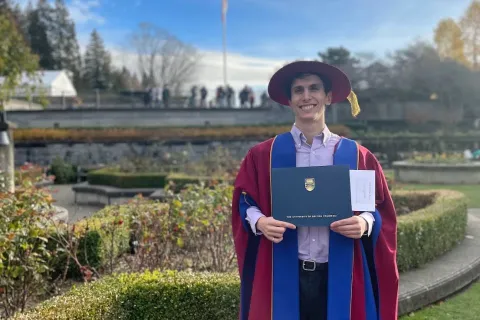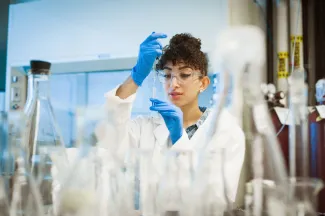“Selecting the ‘right’ problem to solve is often more challenging than solving the problem itself”

Eric Lees
- Degree:
- Doctor of Philosophy
- Grad year: 2022
- Program:
- Campus: Vancouver
I was raised in Kelowna, BC and received my BSc in Chemical Engineering Co-op at the University of Alberta. I joined the Berlinguette group at UBC in 2018 to pursue my PhD in Chemical & Biological Engineering. There, we worked as a team to invent a new reactor that uses acid-base chemistry to convert captured CO2 into fuels and chemicals. My next step will be to join Berkeley Lab as an NSERC postdoctoral fellow, where I will be researching bioelectrochemical processes for synthesizing sustainable aviation fuel.
Why did you choose to go into your field of study at UBC?
Chemical engineering combines physics and chemistry to analyze and develop technologies that improve society’s access to clean energy, air, and water. In the early 20th century, chemical engineers developed new processes that react N2 with H2 to make fertilizer and separate harmful particulates from coal to make clean air. Now, our society faces new challenges caused by climate change that require these same chemical engineering fundamentals (i.e., transport phenomena, fluid mechanics, reactor design) to solve. I chose to pursue my PhD in Chemical Engineering because I wanted to immerse myself in these topics and help discover new chemical technologies that benefit society.
What advice would you give a student entering your degree program?
My biggest piece of advice for new graduate students is to practice thinking about how their research outcomes can be translated to positive impact at the local, provincial, federal, and international levels.
How did your studies in the Faculty of Applied Science prepare you for the future of work?
The advent of renewable energy and the internet-of-things is changing the careers that chemical engineers find themselves in. This is one of the reasons that advanced degrees in engineering are becoming more sought after in industry. As a professor, I hope to provide undergraduate and graduate students with comprehensive chemical engineering training that will prepare them for meaningful careers in the 21st-century chemical industry.

